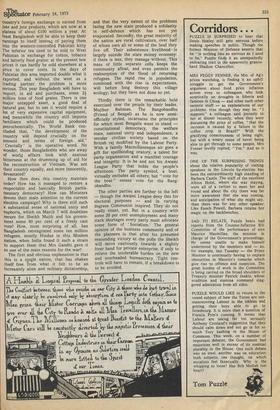Bangladesh
Mujib, India and the elections
Adam Watson
Dacca There is today a very strong current of public feeling in Bangladesh: a Moslem reaction. Mujib's 'secular' policy is not popular. Nor is his visible dependence on India. There is a fear of Hindus in general, and of Calcutta in particular, which arouses apprehensions in all sections of the community, and which took East Bengal into Pakistan in the first place. Now •that the immediate problem of the "Punjabi military dictatorship" has been removed, these fears are reviving; and they extend to dislike of birth control and other progressive measures. Discontent is fanned by the steady fall in the middle-class standard of living, which before the liberation was appreciably higher than across the border in India. Now middleclass goods like cars and refrigerators are actively smuggled to Calcutta, along with the rice given by the Indian government and the jute which should earn hard currency. All these things fetch higher prices in India. People here talk of Calcutta acting like a vacuum cleaner, sucking Bangladesh dry. This discontent and fear expresses itself in the slogan "Don't say Bangladesh, say Muslim Bangla."
In fact the Indians, who have often been all too heavy-handed with their small neighbours, have shown great restraint in Bangladesh. They have been scrupulous about evacuation; generous with aid, especially rice wfiich they need at home; careful not to put pressure on the Sheikh even on issues where their case is strong. All this shows Indira Gandhi's political skill. Mujib is a political asset for her and for India. The last thing the lady wants is to take over East Bengal. Let it be as independent as Finland is of Russia, provided it poses no strategic threat, as it did when part of a hostile Pakistan and as it would if a semi-Communist state supported by China. The way ahead is strewn with obstacles. She cannot afford to maintain Bangladesh, with nearly 80 million people, in the style to which it was accustomed, or even the lower (for the articulate middle class) style of India. She does not even want to let go the Pakistan prisoners of war on which she is being pressed internationally, until the "Joint Command," i.e. Mujib, also agrees, though she is as eager as anyone to see the last of them. But after the elections Delhi may lean rather more heavily on Mujib. Bangladesh will become more obviously a client state of India. Moslem and nationalist resentment and communist agitation seem almost certain to grow, fanned by economic anxiety. The Bangobandhu has many virtues and great prestige. But is he capable of a firm hand? The impression that visitors to Bangladesh get is of a country more peaceful and orderly, less hungry and discontented, than they expected. Were the troubles, the devastation of revolution and war, perhaps exaggerated?
When the fighting ended the new state had no administrative apparatus function ing, no means of maintaining law and order except by grace of the Ind,ian army, and communications, always difficult in this maze of delta waterways, paralysed by the destruction of ferries and bridges. It still takes some three days to cover the 170 miles by road from Calcutta to Dacca; and essential supplies pile up in Chittagong, the chief port and business centre because of the problem of moving them. We are several rice crops on from the troubles, and even with massive aid the rice ration is hardly adequate by the loW local standards. Of course, it has been bad season for rice throughout South and East Asia. The only country with a surplus to sell is ironically Pakistan, from which it cannot officially be bought: fortunately the amount of Pakistan-type rice produced ill Singapore has mysteriously increased enormously.
The economic prospects for the neW state are daunting. "Nowhere else in the world," declares the Bangladesh Planning Commission in Churchillian language, " is there anything like so much povertY shared by so many squeezed into so little a land area." Over two-thirds of the country's foreign exchange is earned from Jute and jute products, which are now at a plateau of about E100 million a year. At least Bangladesh will be able to keep their earnings to itself instead of paying them into the western-controlled Pakistan kitty The inferior tea used to be sold to West Pakistan in exchange for cotton, tobacco and latterly food grains: at the present low prices it can hardly be sold elsewhere at a price to cover costs. In the days of Pakistan this area imported double what it exported, and without the west as a trading partner the problem is more serious. This year Bangladesh will have to import, in aid and purchases, some 24 million tons of food grains. There is one major untapped asset, a good deal of natural gas; but to use it would require a lot of very expensive capital equipment, and meanwhile the country still imports fertilisers which could be produced Petrochemically. The World Bank concluded that, "the development of the country will depend crucially on the amount and terms of foreign aid." ' Crucially' is the operative word. No Wonder, those Bangladeshis who are away of world affairs look with anxious bitterness at the drumming up of aid for the reconstruction of Vietnam. Was not their country equally, and more innocently, devastated?
How then does this country maintain order? How has it managed to restore a respectable and basically British parliamentary democracy? How can Ministers devote their main attention to the current election campaign? Why is there still such a substantial sense of national unity and euphoria, which on March 7 will doubtless secure for Sheikh Mujib and his government some 80 per cent of a freely cast vote? How, most surprising of all, has Bangladesh reintegrated some ten million refugees, mostly Hindus in this Moslem nation, when India found it such a strain to support them that Mrs Gandhi gave it as one of the main reasons for the war?
The first and obvious explanation-is that this is a single nation, that has shaken itself •free from what it felt to be an increasinly alien and military dictatorship, and that the very extent of the problems facing the new state produced a solidarity in self-defence which has not yet evaporated. Secondly, the great majority of the nation are rural cultivators, over half of whom own all or some of the land they live off. Their subsistence livelihood, is largely outside the state money economy: if there is less, they manage without. This mass of little separate cells keeps the community afloat, and even permits the reabsorption of the flood of returning refugees. The rapid rise in population, combined with the rise in expectations, will before long destroy this village ecology; but they have not done so yet.
Thirdly there is the remarkable hold exercised over the people by their leader, Mujibur Rahman. The Bangobandhu (Friend of Bengal) as he is now semiofficially styled, incarnates the principles for which most Bengalis want to stand — constitutional democracy, the welfare state, national unity and independence, a secular civilian society based on the British raj modified by the Labour Party. With a faintly Macmillanesque air goes a gift •for spellbinding oratory, a talent for party organisation and a manifest courage and integrity. It is he and not his Awami League Party that holds the people's affections. The party symbol, a boat, virtually excludes all others; but "vote for the boat" means vote for the Bangobandhu.
The other parties are further to the left — though the Awami League deny this for electoral purposes — and in varying degrees Communist inspired. They do not really count, yet. But in a country with some 20 per cent unemployment and many stark shortages every party must advocate some form of 'Socialism.' The general opinion of the business community and of the planners is that after his presumed resounding victory at the polls the Sheikh will move cautiously towards a slightly freer hand for private enterprise, if only to relieve the intolerable burden on the new and overheaded bureaucracy. Tight controls will have to remain, if a breakdown is to be avoided.



































 Previous page
Previous page